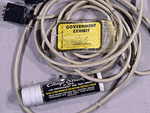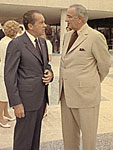Watergate and the Constitution

Students analyze a primary source document which sets forth points both for and against the indictment of Richard Nixon, before considering Constitutional interpretations of Watergate.
The strength of this lesson is that it is centered around a document which presents compelling arguments both for and against the indictment of former President Nixon for his role in the Watergate scandal. The featured document, a memo to the Watergate Special Prosecutor Leon Jaworski, was written by Jaworski's staff as he was considering whether or not to indict Nixon.
The memorandum’s language should be accessible to most high school students. Both a copy of the original document and a transcribed version are available.
The question at the center of the lesson is, "Should the Watergate Special Prosecutor seek an indictment of the former President?" If teachers want to make this lesson more of an historical inquiry, we recommend modifying that question to read: "What were the main arguments for and against the indictment of former President Richard Nixon?"
An additional strength of this lesson is two activities that use the Constitution as a lens to understand the Watergate affair. One of the suggested activities asks students to identify the specific role each branch of government played in the Watergate affair. Another activity asks students to apply specific sections of the Constitution and determine the role particular constitutional powers and rights played in the Watergate affair.
This lesson would likely work best after an introductory lesson on Watergate. While there is no formal assessment included in this lesson, the questions presented by the document easily lend themselves to an essay or a discussion.

Yes
Historical background is detailed and accurate. The document is from The National Archives.
Yes
Th lesson includes background information for teachers and students, as well as a chronology of the Watergate affair.
Yes
The lesson is centered around a primary document from the Watergate scandal, and requires students to read the Constitution.
Yes
Students are asked to weigh the reasons for and against indicting Nixon.
Yes
Yes
The main document is appropriate and accessible for most high school students, as are the teaching activities.
Yes
The lesson includes the Archives' worksheet for analyzing primary source documents, asking students to consider source and contextual information when interpreting the document.
No
Yes
The lesson is clearly presented and is easily adapted to emphasize either History or Civic standards.
Yes
Appropriate for one class period.
